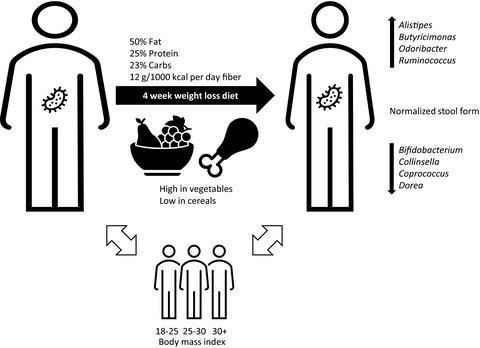当前位置:
X-MOL 学术
›
Microbiologyopen
›
论文详情
Our official English website, www.x-mol.net, welcomes your feedback! (Note: you will need to create a separate account there.)
Low‐carbohydrate high‐fat weight reduction diet induces changes in human gut microbiota
MicrobiologyOpen ( IF 3.4 ) Pub Date : 2021-05-15 , DOI: 10.1002/mbo3.1194 Madis Jaagura 1, 2 , Ene Viiard 1 , Kätrin Karu-Lavits 1 , Kaarel Adamberg 1, 2
MicrobiologyOpen ( IF 3.4 ) Pub Date : 2021-05-15 , DOI: 10.1002/mbo3.1194 Madis Jaagura 1, 2 , Ene Viiard 1 , Kätrin Karu-Lavits 1 , Kaarel Adamberg 1, 2
Affiliation

|
Obesity has become a major public health problem in recent decades. More effective interventions may result from a better understanding of microbiota alterations caused by weight loss and diet. Our objectives were (a) to calculate the fiber composition of a specially designed low‐calorie weight loss diet (WLD), and (b) to evaluate changes in the composition of gut microbiota and improvements in health characteristics during WLD. A total of 19 overweight/obese participants were assigned to 20%–40% reduced calories low‐carbohydrate high‐fat diet for four weeks. Protein and fat content in the composed diet was 1.5 times higher compared to that in the average diet of the normal weight reference group, while carbohydrate content was 2 times lower. Food consumption data were obtained from the assigned meals. Microbial composition was analyzed before and after WLD intervention from two sequential samples by 16S rRNA gene sequencing. During WLD, body mass index (BMI) was reduced on average 2.5 ± 0.6 kg/m2 and stool frequency was normalized. The assigned diet induced significant changes in fecal microbiota. The abundance of bile‐resistant bacteria (Alistipes, Odoribacter splanchnicus), Ruminococcus bicirculans, Butyricimonas, and Enterobacteriaceae increased. Importantly, abundance of bacteria often associated with inflammation such as Collinsella and Dorea decreased in parallel with a decrease in BMI. Also, we observed a reduction in bifidobacteria, which can be attributed to the relatively low consumption of grains. In conclusion, weight loss results in significant alteration of the microbial community structure.
中文翻译:

低碳水化合物高脂肪减肥饮食诱导人体肠道菌群变化
近几十年来,肥胖已成为主要的公共卫生问题。更好地了解由减肥和饮食引起的微生物群变化可能会产生更有效的干预措施。我们的目标是 (a) 计算专门设计的低热量减肥饮食 (WLD) 的纤维成分,以及 (b) 评估 WLD 期间肠道微生物群组成的变化和健康特征的改善。共有 19 名超重/肥胖参与者被分配到 20%–40% 的低热量低碳水化合物高脂肪饮食,为期 4 周。与正常体重参考组的平均饮食相比,复合饮食中的蛋白质和脂肪含量高出 1.5 倍,而碳水化合物含量则低 2 倍。食物消耗数据是从指定的膳食中获得的。通过 16S rRNA 基因测序从两个连续样本中分析 WLD 干预前后的微生物组成。在 WLD 期间,体重指数 (BMI) 平均降低 2.5 ± 0.6 kg/m2和大便频率正常化。分配的饮食引起粪便微生物群的显着变化。耐胆汁细菌(Alistipes、Odoribacter splanchnicus)、Ruminococcus bicirculans、Butyricimonas和Enterobacteriaceae的丰度增加。重要的是,通常与炎症相关的细菌(如科林氏菌属和Dorea )的丰度随着 BMI 的下降而减少。此外,我们观察到双歧杆菌减少,这可归因于谷物消耗量相对较低。总之,体重减轻会导致微生物群落结构发生显着变化。
更新日期:2021-05-17
中文翻译:

低碳水化合物高脂肪减肥饮食诱导人体肠道菌群变化
近几十年来,肥胖已成为主要的公共卫生问题。更好地了解由减肥和饮食引起的微生物群变化可能会产生更有效的干预措施。我们的目标是 (a) 计算专门设计的低热量减肥饮食 (WLD) 的纤维成分,以及 (b) 评估 WLD 期间肠道微生物群组成的变化和健康特征的改善。共有 19 名超重/肥胖参与者被分配到 20%–40% 的低热量低碳水化合物高脂肪饮食,为期 4 周。与正常体重参考组的平均饮食相比,复合饮食中的蛋白质和脂肪含量高出 1.5 倍,而碳水化合物含量则低 2 倍。食物消耗数据是从指定的膳食中获得的。通过 16S rRNA 基因测序从两个连续样本中分析 WLD 干预前后的微生物组成。在 WLD 期间,体重指数 (BMI) 平均降低 2.5 ± 0.6 kg/m2和大便频率正常化。分配的饮食引起粪便微生物群的显着变化。耐胆汁细菌(Alistipes、Odoribacter splanchnicus)、Ruminococcus bicirculans、Butyricimonas和Enterobacteriaceae的丰度增加。重要的是,通常与炎症相关的细菌(如科林氏菌属和Dorea )的丰度随着 BMI 的下降而减少。此外,我们观察到双歧杆菌减少,这可归因于谷物消耗量相对较低。总之,体重减轻会导致微生物群落结构发生显着变化。



























 京公网安备 11010802027423号
京公网安备 11010802027423号